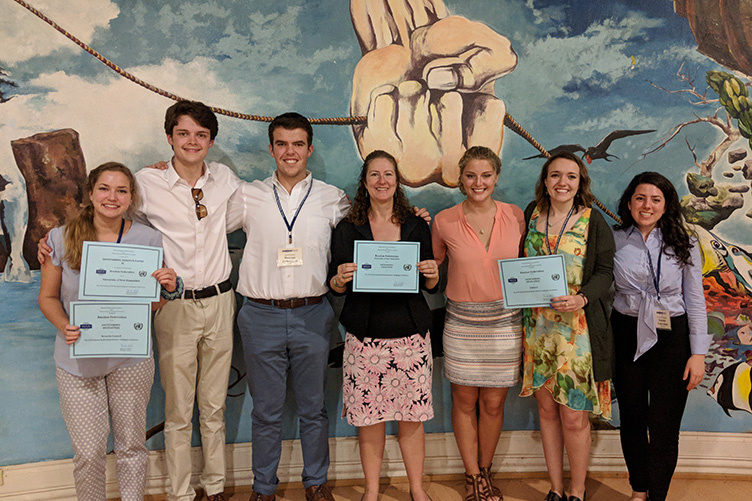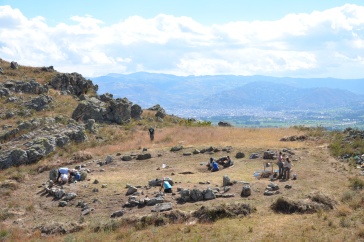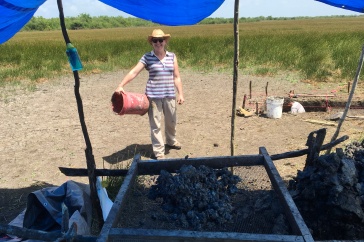
(pictured left to right) Alex Buckman ‘19, Christian Mayoral ‘19, Aaron Promer ‘18, Professor Alynna Lyon, Madison Ferreri ‘19, Crystal Napoli ‘18, Carolyn D'Olympio ‘18
The Galapagos Islands set a breathtaking backdrop for a National Model United Nations conference focused on global sustainability for six members of UNH’s Model United Nations team and their faculty advisor, who experienced firsthand the need to protect the world’s fragile ecosystems. It was the first international conference for the group who has attended the national conference in New York for 14 years.
The team won UNH’s first-ever Outstanding Delegation Award for its representation of Russia and its positions on environmental policy, an award for best position paper, and two best delegate awards. The group also counted gaining an understanding of the island’s fragile ecosystem and bringing diplomacy to Galapagos schoolchildren as major wins.
“It meant a lot to be studying and researching climate change in a place that was first of all, amazing, but also so vulnerable,” said UNH senior Crystal Napoli. “The location was key. We went from talking about waste and pollution in the conference to participating in a beach cleanup where we saw sea lions laying on plastic.”
After a four-day meeting with their National Model United Nations counterparts representing 20 other colleges from the United States, South America and Canada, UNH students apprenticed with a local organization and cleaned beach debris in San Cristobal, Galapagos. At Playa de los Marinos, one of San Cristobal’s key beaches, there is a conflict between the local economy and environmental preservation. The Galapagos people do not have enough resources to build a fully functioning marina, so fishing and shipping boats pull directly up onto the sand. Workers fix and clean the boats on this beach, inadvertently depositing plastic fibers, paint chips and fiberglass pieces onto the sand, polluting the ecosystem of the Galapagos sea lion and other wildlife, explains Napoli.
The National Model United Nations (NMUN) is a nonprofit organization that advances understanding of the United Nations, diplomacy and contemporary global issues. Its programs and conferences aim to provide a diverse group of students and their faculty advisors a forum for addressing global concerns in a real world context. The NMUN-Galapagos conference took place in January, and focused on environmental issues and offered service learning opportunities to students.
At the conference, UNH students represented the country of Russia, with the goal of authentically representing Russian policies as they pertain to environmental policy. Some of the topics the UNH delegation covered included access to clean water, protecting World Heritage Sites against armed conflict and preserving collective security as the world faces climate change-related migration threats. While in conference committees, students were required to represent their country accurately, negotiate for agenda items, form alliances and draw upon previous research to emulate what UN representatives from that country might advocate for in terms of environmental policy.
Alynna Lyon, associate professor of political science and advisor to the UNH Model UN club for the past 14 years, says that preparation for the conference dates back to fall 2016. In order to attend, students knew they had to sharpen both their research and fundraising skills. Under the leadership of Lyon and Napoli, the team raised more than $17,000 from a combination of organizations between 2016 and 2017. These included securing a $10,000 Emeriti Council International Service Grant, which Napoli authored, and donations from alumni, the UNH Parents Association, the UNH Sustainability Program, the College of Liberal Arts, the Department of Political Science, the Hamel Center for Undergraduate Research and UNH Enrollment Management. In May 2017, the UNH team received its country assignment of Russia and worked hard to research and submit a position paper prior to the conference.
“We earned the assignment to represent Russia because we have demonstrated in past conferences that we are a serious school, and we have that reputation because students have worked hard to get us to that place,” Lyon says.
Lyon explains that students draw upon multiple resources — voting records, resolutions, public statements and news media — to better understand a country’s position. In some cases, students must pay attention to what leadership is not saying, or what actions they take after they make a statement.
“What Russia says might not be what Russia means, for example,” Lyon says. “Students have to determine: is this rhetoric or real policy? Russia may have to take the position to block policy and be obstructionist. For example, they don’t want international regulation around their coastline.”
Lyon adds that students worked hard to represent Russia, but also practiced their diplomacy skills to reach a consensus with other countries to pass UN resolutions.
Senior Aaron Promer, a history and international affairs major, transferred from the University of Vermont to UNH in part because of his interest in Model UN. Promer says he was hooked on the club after attending his first meeting and is especially proud to be a part of the Model UN legacy UNH has left.
“Representing Russia was interesting because you have to take a step back. They put on a face of ‘we really want to help,’ but is that the reality of it?” he asks.
Junior Christian Mayoral joined Model UN as a first-year student and credits his teammates for showing other members how to prepare for a conference. Mayoral says he learned a lot about Russian policy and how environmental issues have been portrayed by the Putin administration.
“It’s not a regular competition,” he says. “It’s diplomacy — where you are not trying to win, but you are trying to achieve the most favorable outcome for your country.”
After the conference, the UNH delegation spent time at five different schools in greater Quito, Ecuador, bringing diplomacy to more than 200 students in grades 6 through 12. In the workshops, the Quito students first participated in a simulation, in which they were asked to establish collective security by defending against pirates and to promote international trade by maintaining a road system.
“Before I went to the conference, sustainability was a buzz word I had heard. I really didn’t understand my stake in it,” Napoli says. “By taking part in this conference, I was excited to better understand that it’s not just about sustaining the planet, but understanding more about the people who are affected. Women, children, and indigenous communities are all huge stakeholders is sustainability, but they are often left untapped.”

(pictured left to right) Carolyn D'Olympio ’18, Madison Ferreri ‘19, Crystal Napoli ‘18
You can make a lasting impact through a gift of to UNH.
-
Written By:
Krysten Godfrey Maddocks '96 | College of Liberal Arts | krysten.godfreymaddocks@unh.edu

















































